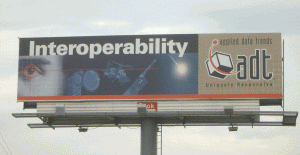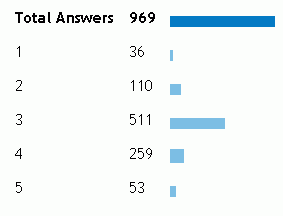
It is an appropriate sign to hang in Intergraph's backyard, a company that has beat the drum of open, interoperable standards for a long time, and in fact makes it a major focus of advertising, conferences, and sales pitches.But has the message sold? It's not that the message is wrong, it's just that it seems to have made little difference in terms of accelerating their market share and revenues.This speaks to their image and perception in the marketplace.
Interoperability is either a poor choice of words or is perhaps misappropriated in certain circumstances.We use it to explain the connectivity or lack thereof between heterogeneous GIS software solution environments.We use it to explain how GIS can or should sit within a large enterprise computing environment. And we use it to describe more general themes, such as this from David Schell, president of OGC, when, in the context of homeland security and the protection of our infrastructure (May 2004 OGC Newsletter), he said:
But here where I sit on the front lines of "interoperability," it becomes more obvious by the day that what is truly more relevant than such dreams is the need to help technology providers working at the most basic levels of civil infrastructure to make society and our institutions work better and cost less.And that if anything constitutes going to the next level for OGC, it is developing the capacity to transfer the consortium's experience and technical know-how to this channel, and to bring these companies en-masse into the consortium process and create a requirements dialogue that results in extending the benefits of interoperability more generally and more rapidly throughout society."Indeed, this is the goal of the OGC, but if this is the next level, what was it doing before? I think Mr.Schell is trying to articulate a vision of how technology supports those front line defenders of our nation's security.I know what he means, and it is proper to try to explain the benefits of open standards for spatial information in the context of educating a broader community of both technology and policy executives, but I thought that is what one of the key goals of the OGC had always been.I encourage you to read Mr.Schell's entire message in the OGC News.
Let's look at our own 2004
GIS Survey where we used the term "interoperability" in one of the
questions related to these goals of the OGC.We asked respondents to rank
the accomplishments of the OGC in establishing guidelines for geospatial
system "interoperability." Of 1050 respondents to date, 969 answered the
question.On a scale of 1-5 (5 being the highest) Here are the responses.

The responses lean more positively this year but more than 50% still
give the OGC a neutral rating when it comes to making a difference and
communicating their objectives.If we can't communicate the most basic
objective of how our technology can work with other mainstream computing
systems, we'll stagnate as a technology sector.
Is "interoperability" simply an awkward choice of words to use as a marketing slogan? I've never seen the word "interoperable" on the box for a USB-enabled printer, external drive, or keyboard.But, then "plug and play" seems a bit trite in terms of explaining how two proprietary spatial databases share and exchange content.It is a dilemma we need to address.
As a start, I suggest placing the word "interoperability" in a different setting to see what the results might be: A parent-teacher's meeting.
Teacher: "Mr.and Mrs.Smith, I'm afraid little Fred lacks some...well...interoperability skills.The other children seem to frown on his open architecture and this doesn't translate well with the remainder of the class infrastructure.But his ETL skills (that's extract, transfer, and listen) are just great for classroom assignments. However, on the playground, GIS (that's 'Gets Into Socializing') just isn't working.We'll need to work on his ability to interoperate from a dynamic global perspective and within the more restrictive school enterprise, as well."Sometimes our verbiage is too pedantic.Parents: "Come again?"